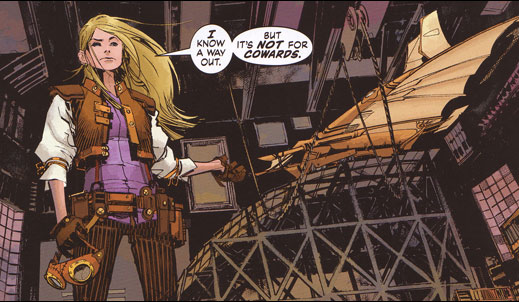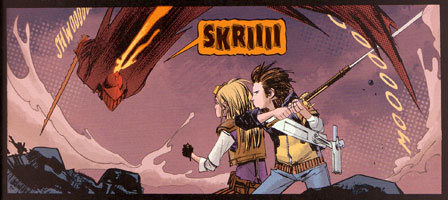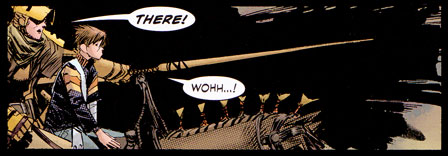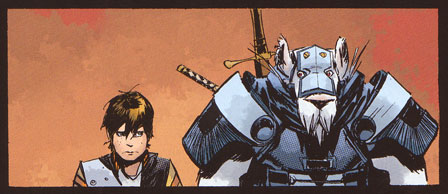Joe the Barbarian
Created by: Grant Morrison, Sean Murphy, and Dave Stewart
Published by: PUBLISHER
ISBN: 1401229719 Amazon
Pages: 224



I almost certainly would have enjoyed Joe the Barbarian more had I not already read I Kill Giants. I still probably wouldn't have thought it magnificent, but I definitely would have believed it more original, inventive, and surprising. I would have thought it high-concept instead of regurgitated concept. And I'm pretty sure that it isn't super fair for me to be so governed by the feeling that I had already been there and done that—by having read Joe Casey's superior story of the overlap between imagination and reality.

So let's question for a moment the value of originality. We often hear praise for a work nestled sweetly in terms like "Creative!" or "Original!" or "Imaginative!" In the end, this usually only tells the reader that the reviewer hadn't before run across the ideas, plot, themes, or storytelling method. Because a reviewer can't have read every book written or heard every story told, references to originality generally ring pretty hollow to those paying attention. After all, without complete knowledge, the review cannot possibly make any such definitive statement. Case in point:
When I was in eighth/ninth grade, I was a moron. Well, maybe not a moron, but I had that kind of hubris typical to young teens who have made some discoveries about the world around them and then have the temerity to believe themselves Knowledgeable. As an eighth/ninth grader, I loved a newish band called Winger (you may feel free here to reassign my young teen self to the category of Moron). Winger had a couple songs I liked at the time* so I picked up the album on cassette. At the end of side one, there was a song called "Purple Haze." It was okay. Despite that, I heard the song a lot since you couldn't reliably skip songs on cassette without a walkman more awesome than what an eighth/ninth grader could come up with. So when I got into a conversation with a friend in Drafting class and "Purple Haze" came up, I was adamant that it was a Winger song. I allowed that this guy Jimi Hendrix (whoever he was) might have covered Winger's song, but insisted that "Purple Haze" by Winger was definitely original because I had never heard Hendrix's version before. When I got home, I asked my dad if he had heard of some guy named Jimi Hendrix. And man did I feel deflated.
That right there was a hard and embarrassing story to tell—but it's apropos because every time someone revels in a work's originality, they're basically reenacting my conversation in Drafting 1. What they're really saying is that they haven't yet personally seen anything like the work being discussed. And that's fine. People deserve to have first experiences left and right if they're able. But we shouldn't ever presume originality because that would just be arrogant of us.
 See? Arrogance
See? Arrogance
The flip side then is the question of whether something should be of greater value simply because we haven't yet experienced anything analogous. Put like that, we can probably pretty easily realize that No, of course a thing isn't inherently better simply because it feels fresh to us. Only, because we're people and people tend to enjoy new experiences, we also tend to veer toward over-enjoying things that feel new to us—things that we might be tempted to describe as original unless we know better. I do this and, I presume, you do this. It's natural.
But with the understanding of our natures comes a certain responsibility to rationally approach our experiences, ready to divorce ourselves from the brunt of that feeling of Holy cats I've never seen anything like this before! (I mean, insofar as we intend to be critically concerned with the works we consume; I don't think there's probably any such responsibility outside the realm of equitable criticism.) And then, this applies not just to works that feel fresh but also to those creative products that feel like they may retread worn ground. It's fine, according to your personal tastes, to choose to indulge works that move in directions you've yet to experience, but as critics of the texts we devour, we should at least attempt to raise ourselves above that kind of pettiness. Or at least alert our readers to the present bias.
So consider yourselves alerted. I will of course do my utmost to keep "originality" from infecting my reading of Joe the Barbarian, but I'll leave it to you to decide how well I succeed. Because, man, this felt like it shared a lot of common ground with I Kill Giants, another DC/Vertigo book from just a couple years back. I'll just leave that there.
Joe isn't much of a barbarian. He's not much of anything outside of a fatherless teen with a big geeky imagination and the kind of disposition that makes him the target of bullies. He's also got diabetes bad enough that an errant journey into the land of hypoglycemia has him seeing all sorts of hallucinated extrapolations of his everyday world. And not just crazy hallucinations but full-fledged, rounded-out scene shifts built of a robust cast of characters and playing according to a coherent-if-bizarre narrative thread. I'm not even sure that's a possible effect of deeply low blood-sugar. So maybe he's super enough to be a barbarian after all. Or at least a wizard-alchemist.

Because he gets picked on one rainy day, Joe neglects to eat his candy bars. He makes some poor decisions and ends up finding his mind straddling this world and one made up of his toys and fears—all while his body is collapsing from some sort of hypoglycemic shock. All he wants is a Pepsi. But no one will give it to him. So things continue apace and he tries to get downstairs to the fridge while all sorts of fantasy tropes stand in his way or try to befriend him.
It would probably be a harrowing tale if Joe was someone I could invest myself in more. It could be that we just don't ever get to see Joe at his most endearing. He begins the book mopey and glum—and angry at his dumb dad who had to go and die as a soldier in a pointless war. Within pages, he's no longer mopey but simple glazed by his diabetic condition. There's not a lot to work with. We do get to see a more loquacious version of Joe in his fantasy world, but for a fabricated self, Joe is pretty timid in that world too. He mostly gets swept along with the schemes of his allies, contributing occasionally as he comes to recognize that he sort of has to.

So a lot of things happen and something is at stake but we can never quite buy into the idea that anything is really at jeopardy in the more fantastic of the two realms. And then, if the imaginary realm in which these great battles take place is supposed to reflect Joe's real life problems (even if only psychological in nature), it's not very clear how any victories or losses there will effect Joe's life—if he can ever get his hands on that damned Pepsi.
Still, while I remained unattached to Joe's character and unengaged by his story, Sean Murphy's art is HOLY KRACKINAMOLEY!!!** Forgetting the always helpful hand that Dave Stewart's colouring lends any book, Murphy draws the heck out of this thing. I don't believe I've ever seen his work before, but I'll be keeping an eye out for his name on projects from this point forward. His staging is superb and he breathes life into even his most fantastic creatures. The expressiveness he portrays through even the roguish barbarian rat outdoes what many artists can accomplish with human faces. As mediocre as Morrison's script and story are (to my eye at any rate), without Murphy's interpretations of that story, Joe the Barbarian would have fallen disastrously flat.

As it is, Murphy at least turns a mediocre book into something really pretty to look at. I'll let other people figure out how plausible Joe's descent into madness and the climactic wrap-up would be from a medical stand point. Though I scratched my head at all that, Morrison couldn't keep me interested enough in Joe's story to do the legwork myself. I like the idea of exploring the line between this world and the ones created in our minds while chemistry is at play, but I simply didn't find Joe a compelling version of the myriad possible tales that could plumb that concept's depths.
Notes
* As a fourteen-year-old, "Seventeen" was magical and fraught with all kinds of mystery that I wouldn't recognize as being ridiculously creepy until several years later.
** Imagine that KRACKINAMOLEY is in Walt Simonson-style effects lettering.
Good Ok Bad features reviews of comics, graphic novels, manga, et cetera using a rare and auspicious three-star rating system. Point systems are notoriously fiddly, so here it's been pared down to three simple possibilities:
3 Stars = Good
2 Stars = Ok
1 Star = Bad
I am Seth T. Hahne and these are my reviews.
Browse Reviews By
Other Features
- Best Books of the Year:
- Top 50 of 2024
- Top 50 of 2023
- Top 100 of 2020-22
- Top 75 of 2019
- Top 50 of 2018
- Top 75 of 2017
- Top 75 of 2016
- Top 75 of 2015
- Top 75 of 2014
- Top 35 of 2013
- Top 25 of 2012
- Top 10 of 2011
- Popular Sections:
- All-Time Top 500
- All the Boardgames I've Played
- All the Anime Series I've Seen
- All the Animated Films I've Seen
- Top 75 by Female Creators
- Kids Recommendations
- What I Read: A Reading Log
- Other Features:
- Bookclub Study Guides









